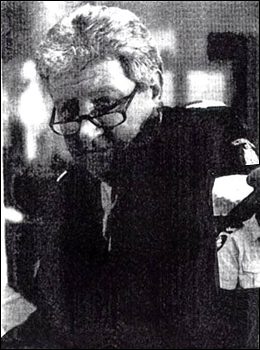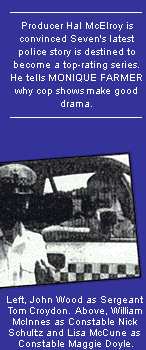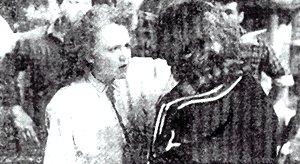

WHEN a friend's 18-year-old son finished school and unexpectedly announced he wanted to be a policeman, Hal McElroy was intrigued. McElroy, a television and film producer whose credits include Picnic at Hanging Rock, Return to Eden and Razorback, wondered what the attraction was for the teenager. "A Cop?" McElroy repeated, leaning forward in the kitchen clatter of Channel Seven's Melbourne canteen to emphasise the point.
"He's 18 years of age. Six months [after graduating from the academy] he had a gun, a pair of handcuffs and a notebook and I thought, 'this is amazing'.
"So I asked him why did he become a cop ... there's just got to be a TV series in young people becoming cops."
McElroy, who had known the young man since he was 10, then learnt that 60 per cent of the police force was under the age of 26. "And I thought, wow, and that percentage is getting higher, not lower, because the stress is so great it just burns 'em out."
McElroy was convinced a show about young police men and women would make "good drama".
Five years and countless script rewrites later, McElroy's hunch has become a television reality. The series he co-created with script-writer Tony Morphett, Blue Heelers, will screen from tomorrow at 7.30pm on Seven.
Blue Heelers is about the goings-on in the mythical Victorian country town of Mount Thomas. Most of the action centers on the small police station and the local pub.
Among the issues the Mount Thomas police and community have to face in the first few episodes are date rape, murder suicide and insurance fraud. All the while, the young city-bred police are adjusting to life in the country, struggling with its often stifling conservatism and chauvinism.
Man of their battles are with the man who runs Mount Thomas station, Sergeant Tom Croydon, played by John Wood. He is a tough, chauvinistic police officer who was born in the bush and believes that the law occasionally can be handled differently there than in the city.
Wood, who is perhaps best known for his leading role in the Seven series Rafferty's Rules, says he was attracted to Blue Heelers because of its strong characters and well-written scripts.
"I've read a lot of scripts since Rafferty's finished and the pilot episode of this [Blue Heelers] was the best I'd read," Wood says.
"[Blue Heelers] is very clearly about police and policing, but it doesn't take itself too seriously; it has the ability to laugh at itself."
Wood describes his character as "much tougher than Rafferty, much more down to earth. But this is really cops with heart".
He believes the show has an appealing element of nostalgia. "It's not a nostalgia for the distant past; it's a nostalgia for the way we used to live, and I don't think that's a bad thing at all. It's a nice sort of nostalgia."
The generally peaceful town of Mount Thomas is the new posting for an energetic young constable fresh from a city police station, Maggie Doyle (played by Lisa McCune), who is the only female officer in the town.
Maggie's arrival causes a stir among her new colleagues, who include an acquaintance from her recent police academy days. Constable Wayne Patterson (Grant Bowler), a flirtatious Detective Senior Constable called P.J. Hasham (Martin Sacks), and a quiet, serious highway patrol cop, Constable First Class Nick Schultz (William McInnes).
According to executive producer McElroy, so many police shows have been produced over the years because they offer viewers gripping yet realistic drama.

Julie Nihill and Josh Picker in a scene from Blue Heelers.
"[Police] are dealing with life and death issues every day. You have 21-year-old police officers going into houses with 40-year-olds or 60-year-olds fighting, and the wife turns to the copper and says: 'What should I do? He keeps on beating me?' And you're 21; you've got to tell the guy who's old enough to be your father he's doing the wrong thing ... you've got to come up with the intestinal fortitude to be able to do that.
"That's great stuff," McElroy says enthusiastically, pounding his fist on the table. "It's hard to do, but it's interesting to watch, which is why cop shows are such perennials."
He says the series' country setting, with filming spread among the Victorian centers of Castlemaine, Williamstown, Laverton and Werribee, has not translated to a soft focus on police issues.
"This isn't straw-chewing, country yokel time," McElroy says. "In many ways police in the country are dealing with microcosms of urban problems. There are often larger social disintegration problems than in urban areas: unemployment is higher; job opportunities are much lower; there are very few intellectual pursuits, and that's a volatile mix.
"If there's an issue in society [police] are involved in, we'll focus on it. I say to the writers thank God we're doing a police show. We don't have to invent the drama; it walks in the door every day."
McElroy also feels Blue Heelers most strongly sets out the differences between right and wrong.
"This isn't about the whole world's f—ed up and what are we going to do. It's about it's good to do the right thing and don't do the wrong thing because you might get caught. And I think at 7.30 at night in today's society it's worthwhile saying that.
"The trick is to say it in as entertaining a fashion as possible."
McElroy beams when the show's potential success and longevity are mentioned, but responds cautiously. "I think the sensible position for me to take is that it's going to be a slow build [in popularity].
"Someone once said to me that television is like a mad aunt. It sits in the corner of your living room and you eat in front of it, you fight in front of it, you sleep in front of it, you play with the dog in front of it, you screw in front of it. It's just like a mad aunt because it's chattering away, but she is a part of the family, that mad aunt.
"The audience has to make you a part of their family, and no-one does that easily."
McElroy and Morphett agree that Blue Heelers pays tribute to the important role that police perform in our society — and to their courage.
"One of our aims," says McElroy, "is to close the chasm [between the public and the police] and say, understand these people, they're human, they have regrets, they don't always get it right, but their intentions are honourable.
"We're certainly going to be pointing out that this is a difficult life that they lead, and a dramatic life, and you shouldn't just think of them as robots in uniform."
McElroy and Morphett's original script was about young police officers at suburban police stations, but they eventually decided there was far more scope for a series set in the country.
An ex-policeman, Michael Winter, who was working as a script adviser, had swayed them with stories of his experiences at a small-town police station. Winter was also responsible for suggesting that the series title, recounting that country police are called "blue heelers" or "tyre biters" because they chase cars.
"Australians have a fondness for the country," says Morphett. "By putting these young, city-bred cops in the country they are discovering an earlier Australia and we're introducing them to country-style policing, where there is still some sort of tradition of trying to sort out a problem before giving a kid a record."
Blue Heelers screens at 7.30 pm Tuesdays on Seven.